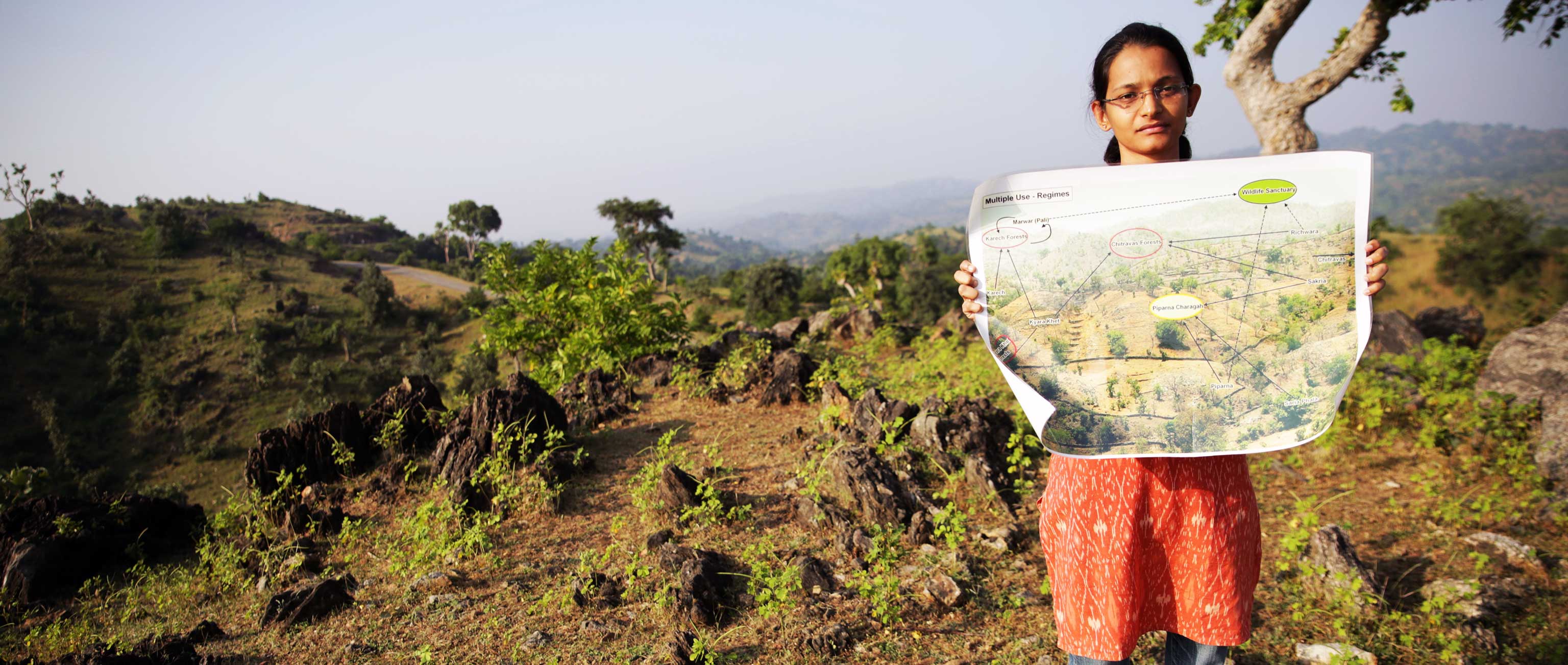Solutions for a Changing Climate

India’s commons—collectively owned land administered by the government—make up as much as 25 percent of the nation’s territory. The government legally owns these lands, but lacks the reach, incentive, and real-time information to effectively manage them. Local villagers, who rely on common lands for their food and livelihoods, lack legal land tenure and thus have limited incentive to invest their time and resources in sustainable management. As a result, commons tend to be neglected to the point of degradation.
Degradation is compounded by climate change, increasing crop failures, fodder scarcity and extreme water stress, heightening the vulnerability of rural communities. At the same time, common lands are disappearing due to illegal land grabs or legal sales. India’s commons have shrunk by more than 30 percent over the last 50 years as a result of inadequate stewardship and protection. When managed sustainably, these forests, pastures, and so-called ‘wastelands’ (non-revenue-generating land) offer critical ecosystem services, including enriching nutrient and moisture content, improving biomass and biodiversity, and capturing and storing carbon.
Foundation for Ecological Security (FES), a 2015 Skoll Awardee, enables India’s rural poor to secure legal rights to access, improve and manage their common lands and water bodies. Partnering with local governments (Panchayats), FES has helped bring 4.25 million acres of land under common management by local villagers, supporting the livelihoods of nearly 12 thousand villages and over 6.5 million people in eight states. Evaluations show marked improvements to soil quality, groundwater tables, ecological diversity, and productivity per acre in FES partner villages. “These improvements increase the resilience of rural livelihoods to droughts and climatic variability,” says Jagdeesh Rao, FES’s Chief Executive.
“Extensive research on governance of common pool resources has highlighted the importance of community institutions to successful governance,” notes Rao. “Self-governance of common resources can be very effective, often more effective than imposed governance solutions. The puzzle is how to empower communities in their ability of self-governance.”
FES is jointly conducting research with several international academic institutions to understand how climate change is affecting rural Indians and to elucidate what types of local climate adaptation solutions are most effective. Almost three quarters of 1,500 households surveyed by FES across five districts of India shared that they had been negatively affected by increasing variability in rainfall and mean temperatures over the last one to two years. These households have relatively low adaptation capacities, but village communities also have traditional coping mechanisms that can be used to improve outcomes in a changing climate. “Strengthening local institutions could help bring in locally agreed behavior and foster adoption of traditional adaptation practices such as exchange of resources (seeds, manure, fodder etc.), pooling for infrastructural and resource development, and diversification of crops, livelihoods and production technologies,” says Rao.
FES also uses its position to voice local concerns through regional, national and global platforms. India’s NDC goal under the Paris Agreement calls for the creation of an additional (cumulative) carbon sink of 2.5–3 GtCO2e through additional forest and tree cover by 2030. Reforestation and restoration of soil health in India’s wastelands and degraded forests could be an important part of the solution. On a national level, forests and land use are increasingly discussed, but Rao emphasizes the need to take a big picture view. “The key challenges lie in moving beyond the ‘technical’ mindset of planting trees or arresting soil erosion and towards diving into the deeper structural issues of property rights and local self-governance arrangements,” says Rao.
Notifications